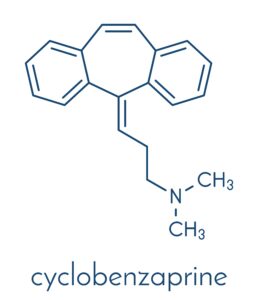Our muscles are remarkable. They tug on our bones, and that helps us walk, dance, and even run. But sometimes, we want those muscles to stop twitching and pulling. And some conditions keep those fibers from relaxing. Cyclobenzaprine is designed to soothe muscle activity. If you’ve hurt your back or tweaked your neck, your pills can mean the difference between crying into your coffee or working happily at your desk. But the same chemical that eases your muscles can also tweak chemicals in your brain. That shift can cause euphoria, which can lead to addiction. In regards to Cyclobenzaprine, can it be abused?

What Is Cyclobenzaprine?
Cyclobenzaprine is a prescription medication given to patients by their helpful doctors. It’s been in use for decades, and when compared to other muscle relaxants, it doesn’t seem overly dangerous. But once you dig into the chemical makeup of this drug, you might begin to understand why experts want people to stop abusing this drug.
When cyclobenzaprine was first introduced, experts weren’t quite sure how it worked. In time, research on rats uncovered the mechanism of action. Now, we know that cyclobenzaprine alters serotonin action in the body.
The chemical serotonin sends signals from one nerve to another. It’s involved in all sorts of body functions, including:
- Mood control. Low levels of serotonin can leave you feeling depressed.
- Sleep/wake cycles. Without the right mix, you might awaken too early or fall asleep too late.
- Serotonin can leave you feeling nauseated, and you can develop diarrhea or constipation depending on your blood levels.
- Cardiovascular system. Serotonin can narrow blood vessels, and that can lead to clots. The chemical can also speed up your heart and lead to muscle damage.
The right amount of cyclobenzaprine will calm activity between stressed muscle cells, which leaves you feeling more relaxed and less painful. But it’s clear the drug can tinker with almost every part of your body as it adjusts your serotonin levels.
Cyclobenzaprine and Pain
You may not think you’ve taken cyclobenzaprine. (It’s not a word that trips lightly off your tongue.) But it’s a very common prescription. If you’ve ever taken Flexeril, Fexmid, or Amrix, you’ve taken cyclobenzaprine. You probably did so because you were in pain.
Researchers say this medication is effective in treating pain. For example, researchers pitted the drug against sugar pills (placebo medications). In published studies, they proved that the medication worked better than nothing.
But your body is adept at self-healing. Tears knit back together, pain chemicals fade, and muscles unclench. If you take no medication, your discomfort will ease. The pills just give you a jumpstart.
In time, your body’s healing ability will catch up with the pills. For that reason, doctors don’t recommend that people take these pills longer than about four days.

Can Cyclobenzaprine Be Abused?
This medication is made to ease pain, and it’s very strong. Doctors give strict instructions on how it should be used. If you begin taking Cyclobenzaprine for other reasons, it can lead to an addiction which puts your health at risk.
A standard dose of cyclobenzaprine is 10 mg, taken three times per day, says the Drug Enforcement Administration (DEA). But people who take over 60 mg of Cyclobenzaprine per day are considered to have abused this drug.
That may sound impossible. How do people take such large doses? Often, it happens in small steps. You might:
- Crowd doses. You know you should take your pills four hours apart, but you slip the new one in at the three-hour mark.
- Cite pain. You know you should use only one tablet, but you tell yourself you require a second.
- Feel the need for more. In time, your body craves the drug. You take it to keep yourself from feeling overwhelmed with desire for it.
Most people who have abused cyclobenzaprine also take other drugs, says the DEA. They use the prescription medication to ease discomfort caused by:
- The high of cocaine can make sleep impossible. Popping a pill can unlock your muscles and allow for rest.
- Heroin or painkillers. Between doses of opioids, your muscles can lock. Cyclobenzaprine can ease that symptom.
- Hallucinations and anxiety take hold between drinks. This medication can soothe that discomfort.
It might be hard for you to separate one addiction from the other. You might just feel like you need drugs, although you can’t really tell which drug you want more.
But if you take high doses of cyclobenzaprine, regardless of the reason you do so, you can face serious side effects, including:
- Anxiety
- Hallucinations
- Irregular heartbeat
- Seizures
- Stiff muscles
- Vomiting
This is a medical emergency. You must go to the nearest emergency room for help. Doctors can use fluids to flush the drugs out of your system, and they can offer medications to slow your racing heart and ease your anxiety. But you’ll need to do more to make a full recovery.

How to Stop Taking Cyclobenzaprine
Cyclobenzaprine can cause both physical and psychological dependence as well as withdrawal symptoms from being abused. When that happens, it’s hard for you to stop taking the drug on your own. It’s especially difficult to quit if you’re been mixing this drug with other substances like cocaine and heroin.
In a treatment program, the team can use blood tests and urine screenings to determine what you’ve taken and how much damage was done. Then, they can create a withdrawal program for you. That might involve:
- Medication management. Some drugs, including heroin and alcohol, respond to medications that ease cravings and soothe withdrawal symptoms.
- Bland foods and cool drinks can help you regain your strength as your body heals.
- Gentle movement. No one expects you to do hard workouts during withdrawal. But an easy walk or gentle stretches could help your body to process remaining drugs.
- You’ll do the bulk of your recovery work in rehab. But your team might use techniques to increase your urge to stay in treatment and maintain your sobriety.
When you’re feeling sober and strong, you’ll move into rehab. There, you’ll dig into the causes of your addiction and look for ways to improve.
For someone who abuses cyclobenzaprine, pain management techniques might be helpful. Experts say back pain is responsive to gentle exercise, stretching, biofeedback, and massage. Your team might devise a program to help you understand how to quell discomfort without pills, so you won’t be tempted to relapse.
You’ll also spend time with a counselor, either alone or in groups, to build up your strength in sobriety and move toward a healthier future.
Plan to spend a few weeks in rehab, so you’ll give yourself enough time to make your lessons stick. And then plan to follow up with support groups to maintain your connection with the recovery community.
Cyclobenzaprine Addiction Treatment in South Florida
If you or your loved one have become dependent on Cyclobenzaprine and are experiencing the signs of addiction, it is important that you receive treatment. The withdrawal symptoms can be difficult to get through, but rest assured, the team at Ambrosia Treatment Center is ready to treat your Cyclobenzaprine addiction. Take a look at our admissions process or give us a call at (561) 467-7547 so we can help as soon as possible.




